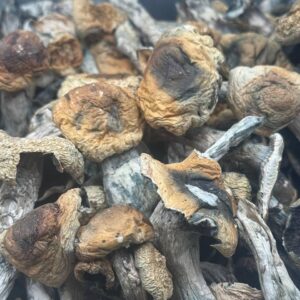Tidal Wave Mushroom
$400.00
Tidal Wave Mushroom
Tidal Wave Mushroom is a potent and visually striking variety of Psilocybe cubensis, renowned for its wave-like patterns and intense psychedelic effects. This strain, often abbreviated as TW, delivers a surging, immersive experience that can feel like riding a tidal wave of hallucinations and insights, making it a favorite among experienced psychonauts. Containing high levels of psilocybin and psilocin, it’s prized for its ability to induce profound visual distortions and emotional depth, but it requires respect due to its strength. As with all psilocybin mushrooms, Tidal Wave is illegal in most jurisdictions and should only be approached with caution, legality, and professional guidance.
This comprehensive guide explores the Tidal Wave Mushroom strain origins, characteristics, effects, cultivation, and precautions. Drawing from mycological literature, user anecdotes, and scientific studies on psilocybin, it provides an in-depth look at this enigmatic strain. Remember, psychedelic exploration is not for everyone—prioritize mental health, safety, and ethical considerations.
Origins and History
The Tidal Wave Mushroom strain is believed to have originated in the humid, tropical regions of Southeast Asia or possibly as a hybrid developed in mycological communities during the late 1990s. Its name evokes the undulating, wave-like visuals and the overwhelming “rush” of its effects, which can sweep users into altered states of consciousness.
- Discovery and Naming: Mycologists speculate that Tidal Wave emerged from natural mutations in wild P. cubensis populations, adapted to coastal or riverine environments where “tidal” influences like moisture fluctuations shape growth. It gained popularity in online forums for its distinctive appearance and potency, with users describing trips as “crashing waves of reality.”
- Cultural Impact: In psychedelic circles, Tidal Wave is often discussed alongside strains like Blue Meanie or Penis Envy for its intensity. It’s featured in trip reports and art, symbolizing the ebb and flow of the mind. Its rarity has made it a collector’s item, traded in research-oriented communities.
- Rarity and Availability: Not as widespread as Golden Teacher, Tidal Wave spores are sought after for microscopy or educational purposes, though cultivation remains restricted.
Historically, Tidal Wave Mushroom’s development parallels the global interest in psychedelics. As psilocybin research expanded in the 2000s, strains like this were cataloged for their unique traits. Its wave-patterned caps may reflect genetic adaptations to variable humidity, enhancing resilience in diverse climates.
Key Characteristics
Tidal Wave mushrooms are notable for their aesthetic appeal and robust potency, setting them apart in the P. cubensis family.
- Appearance: Caps are medium to large (4-7 cm in diameter), with a wavy, undulating edge that resembles ocean waves. They start conical and flatten, displaying a golden-brown hue that bruises blue upon touch. Stems are thick, fibrous, and white, often with a slight curve. Gills are crowded and dark, releasing spores that form a purple-black print.
- Potency: Exceptionally high in psilocybin (up to 1.2-2.0% dry weight), Tidal Wave rivals the strongest strains. Trips last 7-12 hours, with effects peaking intensely.
- Growth Cycle: Fruits rapidly in warm, humid conditions, producing prolific clusters. It prefers nutrient-rich substrates and can yield multiple flushes.
- Comparison to Other Strains: More visual and cerebral than body-heavy varieties like Mazatapec, Tidal Wave offers less nausea but greater intensity, making it unsuitable for beginners. It’s akin to a “wave rider” in the psychedelic spectrum.
Delving deeper, the wavy cap margins are a genetic quirk, possibly aiding spore dispersal in windy environments. Blue bruising indicates active psilocybin conversion, a sign of freshness. Chemically, Tidal Wave’s profile includes balanced alkaloids, contributing to its smooth yet powerful onset. In ecology, it thrives in disturbed soils, breaking down organic matter and supporting plant growth through mycorrhizal networks.
Effects and Experiences
Tidal Wave Mushroom is celebrated for its dynamic, wave-like progression of effects, blending visuals with introspection.
- Psychological Effects: Intense hallucinations featuring flowing patterns, morphing landscapes, and synesthesia. Users report ego dissolution, philosophical breakthroughs, and a sense of being “carried by the tide.” It’s ideal for deep exploration but can be disorienting.
- Physical Effects: Initial nausea is mild, giving way to euphoria, heightened senses, and a gentle body buzz. Energy surges, with some experiencing time dilation.
- Therapeutic Potential: Studies on psilocybin suggest Tidal Wave Mushroom could help with depression, anxiety, and PTSD, amplifying emotional processing. Microdosing may enhance creativity and focus.
- Dosage Recommendations: Start low (1-2 grams for novices); advanced users take 3-5 grams. Test potency and weigh accurately.
Anecdotal reports from Erowid and Reddit describe Tidal Wave Mushroom trips as transformative: one user likened it to “surfing cosmic waves,” gaining clarity on personal issues. Visuals often include fractal oceans or undulating forms, fostering awe and insight.
Physically, the strain’s low body load makes it accessible, though heart rate increases warrant monitoring. Therapeutically, its potency supports clinical trials, where guided sessions yield lasting benefits. However, not all experiences are euphoric—set and setting are critical to avoid overwhelm.
Cultivation Tips
Growing Tidal Wave requires precision, as its potency demands sterile conditions.
- Substrates and Environment: Thrives on rye grain or coir-based mixes. Ideal temps: 75-85°F (24-29°C) with 90-95% humidity.
- Process: Inoculate sterilized jars, incubate 7-14 days, then transfer to fruiting chambers. Harvest at full veil break.
- Yields and Challenges: Produces 2-4 grams per flush; contamination is a risk. Beginner kits simplify the process.
- Legal Note: Illegal in most areas; this is for educational purposes only.
For expansion, cultivation begins with spore syringes from ethical sources. The All-In-One Grow Bag method is popular for Tidal Wave Mushroom, combining substrate and casing. Incubation in a dark, warm space allows mycelium to colonize fully. Fruiting needs fresh air and indirect light to prevent stunting.
Yields depend on setup; monotubs can produce hundreds of grams. Challenges include green mold—use HEPA filters for airflow. Advanced techniques like grain-to-grain transfers boost efficiency. Resources like Stamets’ books provide visuals, emphasizing that cultivation knowledge fosters appreciation without endorsement of illegality.
Risks and Precautions
Tidal Wave Mushroom power comes with responsibilities. Risks include bad trips, especially for those with mental health issues. Avoid interactions with medications or substances. Have a trip sitter, prepare mentally, and integrate afterward.
Expanding, contraindications include psychosis history or heart conditions. Pregnancy is risky due to unknowns. To mitigate, start with intention-setting and a safe space. Overuse may cause tolerance or rare issues like HPPD. Communities stress harm reduction, with tools like dosage calculators.
Responsible use involves education and consent. If exploring therapeutically, seek clinical guidance, as decriminalization grows in places like Canada.
Conclusion
The Tidal Wave Mushroom strain offers a thrilling, wave-swept journey into the depths of consciousness, blending beauty with intensity. Its name captures the essence of its effects—powerful yet fluid. For those intrigued, remember: safety, legality, and respect are paramount. Psilocybin holds promise for healing, but informed exploration is key.
| QUANTITY | P |
|---|
1 review for Tidal Wave Mushroom
Add a review Cancel reply
Related products
Mushrooms
Mushrooms
Mushrooms
Mushrooms








Zack Mosier –
Tidal Wave Mushroom strain took me on a luxurious trip filled with a sense of playful wonder